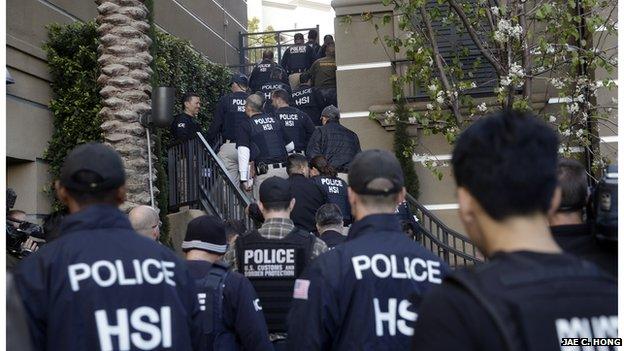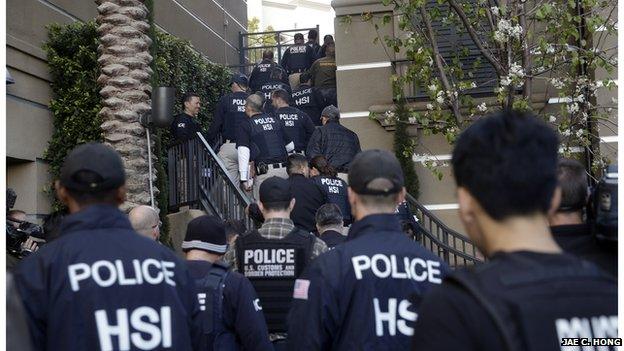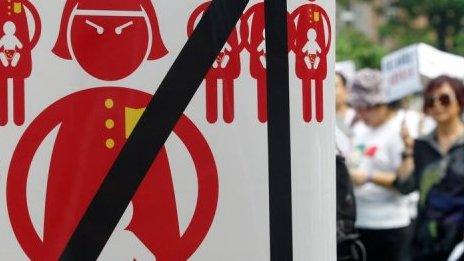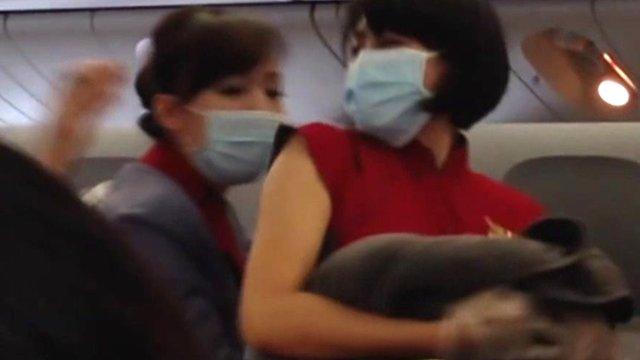Plane birth sparks controversy in Taiwan
- Published
The baby girl was delivered by a doctor who happened to be on the flight
A recent video of stewardesses cooing over a baby born suddenly on a China Airlines flight made for a heart-warming story.
The mother was flying from Taipei to Los Angeles on 7 October went she went into labour six hours into the flight, eventually delivering a healthy baby girl with the help of a doctor on board. The plane was diverted to Alaska.
The story was widely picked up by international media, including the BBC. But in Taiwan, where the woman is from, it has been met with scepticism.
Many there have asked how she was able to board a plane so late in her pregnancy, and what her motivations were for doing so.
Some, including MPs, have even alleged - without proof - that she was rushing to the US so her child could be a US citizen, and had lied about her pregnancy to get on board. They say she could be handed a bill for the cost of the diversion.
Suspicions raised
The speculation began online shortly after the birth made the news last week, and continued when the unnamed woman was deported back to Taiwan from the US on Saturday, refusing media interviews. The baby remains in the US in the care of a friend, according to reports.

In March the US carried out raids on hotels catering to "birth tourists", over accusations of visa fraud
A recent Facebook post by a former China Airlines stewardess containing even more damaging allegations about the woman only fuelled suspicions.
At a legislature meeting on Monday, several MPs pressed Transport Minister Chen Jianyi on the matter - as the Taiwan government is the majority shareholder of China Airlines, lawmakers demanded to know if taxpayers' money had been "wasted" on diverting the plane.
Kuomintang legislator Lo Shu-lei alleged that the woman was responsible for the diversion, estimated to have cost the airline tens of thousands of dollars, "because she wanted a US passport" for her child.
Mr Chen said he would direct China Airlines to see if the woman could pay compensation.
The airline, meanwhile, has said it does not allow passengers who are more than 32 weeks into their pregnancy to board without a doctor's note.
It said it allowed the woman, who did not have a medical note, to board because she had told staff she was in an earlier stage in her pregnancy.
"We are advising our insurance companies to check if she had reached 32 weeks in her pregnancy at the time of her boarding," a spokesman told the BBC.
Political worries
Sociologist Pei-chia Lan told the BBC the uproar has tapped into a deeper resentment over the trend of "birth tourism" among affluent Taiwanese, as well as an upsurge in nationalism.
"The common criticism, whether justified or not, is that the woman was acting selfishly and putting her interests before everyone else's," says Prof Lan, who is with the National Taiwan University.
The fact that the US grants citizenship to babies born there has attracted thousands in recent years. Entering the US on a tourist visa for medical reasons remains legal, external as long as mothers fulfil certain requirements, such as paying for their own hospital care.
It ties in with the concept of "flexible citizenship" held by upper middle-class families, says Prof Lan, where they "gain multiple passports for their children to maximise their economic opportunities".
In Taiwan's case, birth tourism has also been fuelled by worries about the country's political future and the ever-present spectre of possible reunification with China, an idea that many Taiwanese oppose amid rising nationalism.
"One of the reasons why this may have become so big is because of resentment about class privilege, and also the implication that Taiwanese citizenship is somehow devalued," says Prof Lan.
Self-confessed birth tourists have in turn defended the practice.
Taiwanese blogger Haidizizi made waves in May when she wrote about her own experience of travelling to the US to give birth.
"It's not because I don't love Taiwan, but I don't want my little darling to have to switch to a red Chinese passport in the future!" she wrote.
- Published3 March 2015

- Published25 April 2012

- Published14 October 2015
